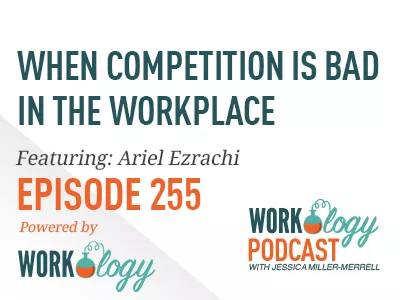As HR leaders, we’re always focused on culture in the workplace – measuring employee engagement on a cultural level, improving morale and the culture that our employer brand represents. Particularly in the tech sector, competition has become hard-wired into so many company’s cultures, including hack-a-thons and internal time to market goals, leaderboards, and awards for being the fastest, best and most innovative. But what does this do to the culture of our workplace?
Episode 255 – When Competition Is Bad in the Workplace with Ariel Ezrachi (@ArielEzrachi)
This is exactly what I asked Ariel Ezrachi, the Slaughter and May Professor of Competition Law at the University of Oxford and the Director of the University of Oxford Centre for Competition Law and Policy. He is the author of Competition Overdose: How Free Market Mythology Transformed Us from Citizen Kings to Market Servants.
Ariel said that “the assumption is that competition will always deliver the best results, so we have this notion when we face any problem in our modern life, if we don’t have another remedy, then just unleash competition and the wonderful and mysterious market forces will optimise. We will get lower prices, better outcomes, more efficiency, more innovation.” In his book, Ariel explains, “we explore instances in which competition just does not deliver. We look at the way competition works outside the workplace, and then very often we assume, well, if this can deliver more when we look at markets, surely it can deliver more when we apply it inside the workplace. This is when the assumption of greater competition actually collapses within the organization and not only does not deliver, it also becomes toxic.”
There is no single definition of what competition is. This creates a simplified narrative that competition is always good, but there are many ways to look at it. We’re so hard-wired to be competitive, it’s like a religion. You have a lot of examples in your book about what happens when competition becomes negative.
[bctt tweet=”When you create a culture of winners and losers, then employees have absolutely no respect for their peers. @ArielEzrachi #HR #Podcast #Workology ” username=”workology”]
Ariel explained that we can “advance healthy competition within the organization or you can advance zero-sum game competition, competition that you would refer to as warfare, where it is a certain assumption that your benefit is my cost. And when I benefit, it has to come at your cost.” One example he shared is about how Enron used competition within the organization to create an employee evaluation where you were competing against the other employees. And if you were performing highly in a relative sense, you were safe, but the bottom 15 percent was always pushed out. “In this case, we could assume that competition brings the best out of us, that this would bring us more efficiency and better outcomes for the company. In hindsight we know that this was far from the case. When you create a culture of winners and losers, then employees have absolutely no respect for their peers. What employees did [in the case of Enron] is try everything in order to undermine their peers, and that had consequences for the company. That competition backfired.”
In the workplace, Ariel said, “People want to have a sense of belonging. People want to feel engaged. And people want to have a stake in the company’s future. The last thing people want is some sort of toxic competition where they are pitted against each other, because there isn’t enough space for employees to serve those greater goals because suddenly they become survivors. They go down in the pyramid of needs and suddenly they have to worry about other things. So the way to get the most out of your employees and the way successful companies do that is to have a greater goal, have some sort of aspiration and have the concept of competition.”
When it comes to our workplace culture, we believe we’re doing all the right things to make our employees happy and productive, but the idea of removing competition from our cultural models turns this on its head a bit. We can’t uncover this by sending employee surveys – even our employees don’t know that competition can be toxic if they see examples of it everywhere throughout large, innovative companies. And workplace leaders simply can’t see the forest for the trees. I appreciate Ariel’s fresh perspective on creating a purpose-driven workplace culture.
Connect with Ariel Ezrachi.
RECOMMENDED RESOURCES
– Competition Overdose: How Free Market Mythology Transformed Us from Citizen Kings to Market Servants
– 5 Ways to Crush the Competition in 2020
– Ep 248: How to Help Remote Teams Be Productive
How to Subscribe to the Workology Podcast
Stitcher | PocketCast | iTunes | Podcast RSS | Google Play | YouTube | TuneIn
Find out how to be a guest on the Workology Podcast.








